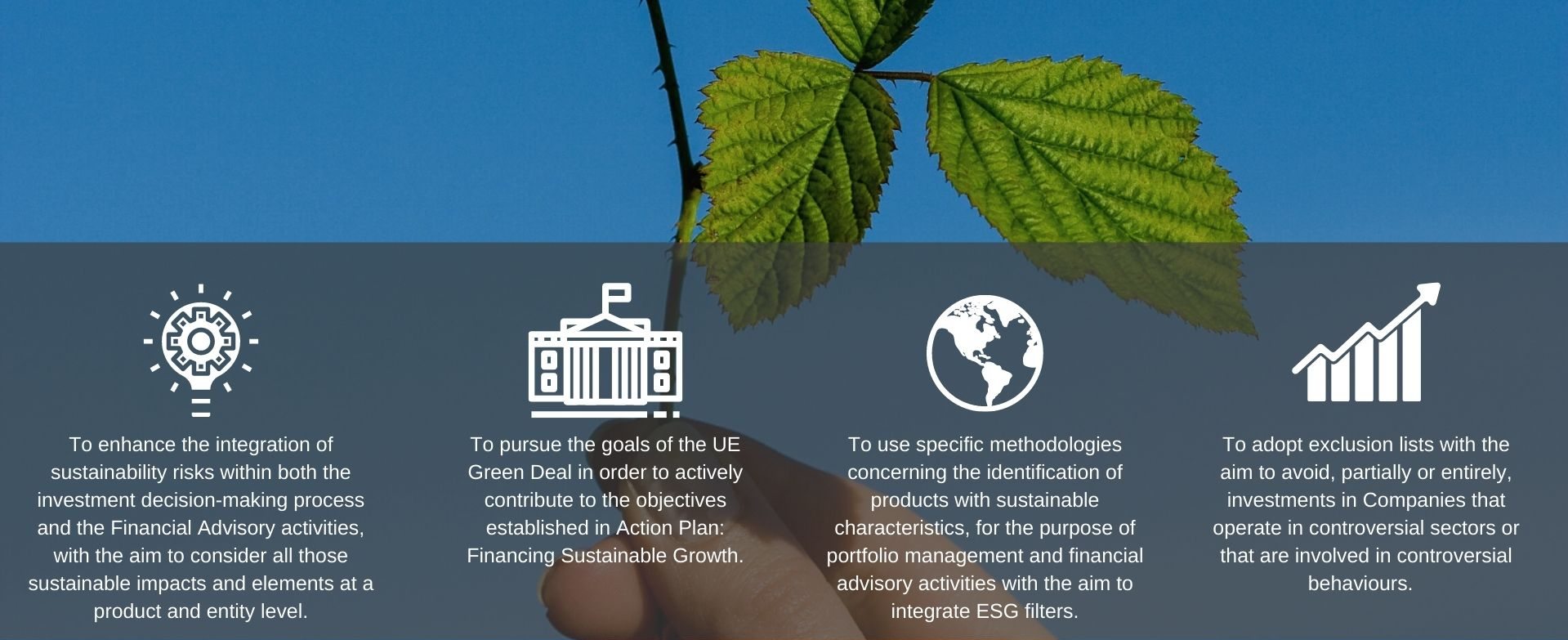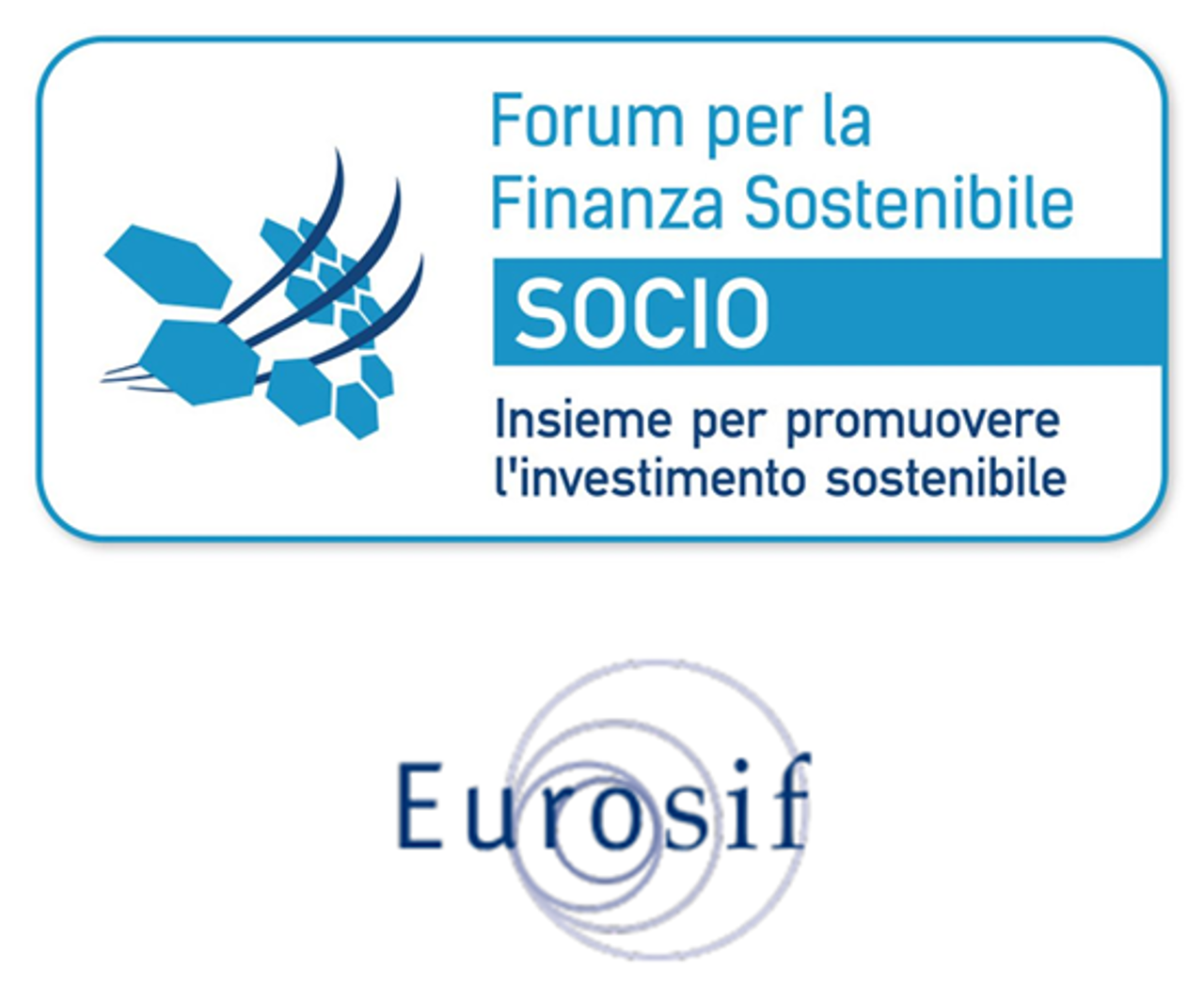
Responsible Investments
Among the different financial services, we also promote sustainable investments and support our customers in building portfolios that take account of their personal sensibilities to ESG (environmental, social and governance) issues.
The three pillars of ESG
Environment, society and governance: these three pillars are the source of the acronym “ESG” (environmental, social and governance), which encompasses three different approaches to sustainable investments.
The first pillar — the environment — refers to themes relating to reducing pollution and rationalising waste. The second — society — relates to gender policies, human rights, labour standards and relationships between productive enterprise and the community in which it operates. The third — governance — has to do with sound governance practices for companies and virtuous behaviour by businesses in the area of legal compliance and business ethics.
In pursuit of these goals, we promote sustainable investments and stand shoulder to shoulder with our customers in building ESG portfolios.

How the responsible investment process works
We have adopted procedures and methods that integrate the investment analysis conducted according to traditional financial criteria with an analysis focused on sustainability risks and potential negative impacts of investments on sustainability factors.
We can determine thanks to ESG indicators and an ESG screening, developed with the support of external advisors, whether the companies to which we direct investments are involved in controversial sectors or have violated the United Nations Global Compact.
On the basis of this screening, both norm-based or negative, the securities of companies analyzed are admitted to our investment universe or, in cases of controversial practices and sectors, are subject to exclusion. More specifically:
- it is not allowed to invest ("Restricted List") in the securities of companies that have committed serious or systematic violations of human and workers' rights, that have severely damaged the environment or that are involved in serious episodes of corruption. Companies that produce unconventional weapons or that derive significant revenues share from coal, conventional weapons, tobacco, gambling and adult entertainment are also excluded.
- the securities of companies involved in controversies that indicate insufficient attention to ESG aspects with potential negative impacts on sustainability factors are also constantly monitored and at risk of exclusion ("Watch List") from our investment universe. This category includes, for example, companies directly involved in the production of nuclear weapons or indirectly involved in the cluster munition, anti-personnel mine and/or biological and chemical weapons market, as well as companies involved in violations of the Global Compact if not of a serious and systematic nature.
In addition, within our investment lines underlying the managed portfolios that promote environmental or social characteristics i.e., classified under Article 8 under EU Reg. 2019/2088, promote the aforementioned characteristics for the E,S and G pillars:
- Environmental: protecting the environment by controlling the direct and indirect impacts driven by the economic activities of investments (e.g., use of renewable energy, GHG emissions and energy management, waste management and circular economy, water and soil management, biodiversity), also along the supply chain;
- Social: respect for human rights, occupational health and safety, and human capital development; fostering social cohesion and integration, also along the supply chain;
- Governance: supporting effective governance actions that aim to ensure the pursuit of appropriate ESG strategies and appropriate tax and ethical compliance.
In order to pursue these characteristics we select financial instruments through the use of the ESG score, a sustainability indicator used to measure compliance with environmental or social characteristics and intended to reflect the performance of the assets being invested in on a scale of 1 (low rating) to 5 (very high rating). We rely on a specialized ESG rating provider to provide the ESG score.
The ESG rating is determined by comparing the ESG performances of an issuer with those of issuers in the same industry. In the case of mutual funds and SICAV, we also take into account -in addition to the analysis of the ESG performance of the underlying investments-the institutional commitment and strategy pursued by the operator in considering sustainability in investment decisions.
At least 75% of the value of portfolio - excluding cash - is invested in underlying assets with a sustainability score of at least 3; in addition, underlying assets with a score below 2.5 are excluded. The portfolio's overall ESG rating is at least equal to 3. In addition, we integrate this methodology with the identification of relevant ESG controversies, which allows us to identify the reason for the violation, the causes that grave rise to it and the measures taken to face and tackle the problem.
Regulation (EU) No. 2019/2088 has introduced disclosure obligations on the integration of sustainability risks and the consideration of adverse sustainability impacts in investment processes: for further information, visit the page with Banca Generali's information on sustainability in the financial services sector.
Active Ownership Strategy
With a view to strengthening the integration of sustainability factors into the investment process of managed portfolios and to encouraging investee companies to adopt sustainable business policies and good governance practices, Banca Generali has adopted an Active Ownership Strategy. With regard to the products related to the provision of individual portfolio management and collective asset management services classified under Articles 8 and 9 of EU Regulation 2019/2088, established and managed by Banca Generali or its subsidiaries, the Policy defines a framework aimed at identifying the procedures for exercising voting rights and the related policies, the engagement procedures to be adopted with corporate issuers or managers, the roles and responsibilities of the various corporate functions, the methods of managing any situations in which conflicts of interest may arise, and the transparency commitments and methods for disclosing the results of the Active Ownership strategy.
Investments in support of SDGs: measurement of impacts
We believe that private investors may also play an active part in implementing the international sustainable development agenda by financing, through their investment choices, companies committed, for example, to reducing greenhouse gas emissions and more efficient use of resources, offering high-quality care services or products for healthy nutrition, as well as companies capable of creating an inclusive workplace oriented towards the wellbeing of their employees.
In collaboration with MainStreet Partners, we have thus developed a proprietary platform capable of providing an in-depth analysis of the level of sustainability of individual investment products, and of calculating the degree of alignment to the individual Sustainable Development Goals (SDGs) promoted by the United Nations, determining its positive contribution in tangible terms through the use of appropriate metrics. These measurements related to the SDGs and the positive contribution of the investment, such as pollution reduction, water saved, support for local communities, or gender equality, are available for a selected perimeter of the products belonging to the investible universe.
Partnerships to promote responsible investment

We have been ordinary members of the Forum for Sustainable Finance (SBB) since May 2019. Born in 2001, the Forum for Sustainable Finance is a multi-stakeholder non-profit association: it includes financial operators and other organizations interested in environmental impact and social investment.
Eurosif
The Association promotes the knowledge and practice of sustainable investment, with the aim of spreading the integration of environmental, social and governance criteria into financial products and processes.
The Forum is a member of Eurosif, an association committed to promoting sustainable finance in European markets.
Principles for Responsible Investments
At the end of 2022 we adhered as Banca Generali Group to the Principles for Responsible Investments (PRI), promoted by the United Nations, confirming our commitment made in the Strategic Plan, in line with its Vision, to aim to be the first Private Bank in terms of Value of service, Innovation and Sustainability.
The Principles for Responsible Investment (PRI) were launched in 2006 with the intention of fostering the spread of sustainable and responsible investment among institutional investors. Being part of the PRI network will allow Banca Generali to participate in a unique platform for dialogue with institutions and collaboration with industry peers.
